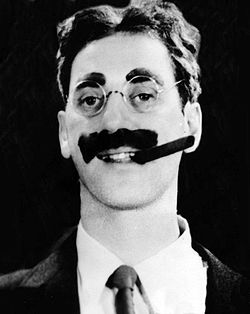

Groucho glasses (also known as the beaglepuss [1] ) are a humorous novelty disguise which function as a caricature of the stage makeup used by the comedian Groucho Marx in his movies and vaudeville performances. They typically consist of black frames without lenses with attached features including bushy eyebrows, a large plastic nose, bushy moustache, and sometimes a plastic cigar.
Contents
- Guinness Record Attempts
- Durango’s Snowdown Festival (1988)
- Gorham Record (2006)
- References
- External links
Considered one of the most iconic and widely used of all novelty items in the world, Groucho glasses were marketed as early as the 1940s [2] and are instantly recognizable to people throughout the world. [3] The glasses are often used as a shorthand for slapstick [4] and are depicted in the Disguised Face (🥸) emoji. [5] [6]